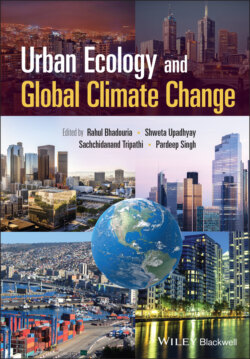Читать книгу Urban Ecology and Global Climate Change - Группа авторов - Страница 15
1.1.1 Urban Ecology
ОглавлениеNowadays most of the people live in the urban areas; however, they have limited understanding of the benefits derived from the interaction with the natural systems within the cities. Urban ecology is a scientific discipline which integrates a number of concepts from the natural and social sciences along with the landscape approach and ecosystems services at its core (Alberti 2008; Niemelä et al. 2011; Niemelä 2014) and represents the ‘holistic ecology of urban areas’ (McDonnell et al. 2009; Jim 2011). Since this field is still emerging, its hypotheses, models, and theories are still in the process of testing and validation (Niemelä 2014). Since human activities are the dominant factors in shaping the urban ecosystems, the urban ecology unintentionally revolves around the processes and interactions attributed by the human actions (Verma et al. 2020a). For example, urban ecology helps in recognising the restorative behaviour of humans for the natural ecosystems and elucidating the mechanisms responsible for the structuring of urban communities during the process of urbanisation (Steiner 2014; Duffy and Chown 2016). However, poor understanding of the complex interactions between the socio‐ecological and infrastructural developments in the urban ecosystems resulted in the social disharmony in the long term (Kattel et al. 2013). Therefore, Kattel et al. (2013) suggested a concept of complementary framework for urban ecology which represents the development of infrastructure and green spaces in an integrated manner to derive utmost ecosystem services. For instance, integrated development of flora and fauna along with the urban buildings, roads, and railway tracks for providing the utmost scope for the interactions between human inhabitants and wider communities through inter‐habitat‐community systems (Halpern et al. 2008).
Recent studies on urban ecology revealed that the field is now viewed as the ‘ecology of the city’ in addition to the ‘ecology in the city’ (Grimm et al. 2000; Pickett et al. 2001; Kattel et al. 2013; Childers et al. 2014). The ‘ecology in the city’ refers to the study of the natural ecological systems (fragments) within an urban ecosystem, i.e. different urban fragments as the analogues of their non‐urban counterparts, whereas ‘ecology of the city’ represents a much wider context where urban ecosystem itself is studied as an ecological system, i.e. the study of the interactions of various biological, built, and social components of the ecosystems within a city (Vasishth 2015; Pickett et al. 2016; Verma et al. 2020b). Based on these diverse concepts of the urban ecology, following sections shall provide a brief understanding of the urban ecosystems. In the next sections, climate change as an emerging challenge to the urban ecosystems has been discussed, followed by the possible urban ecological approaches for mitigating the ill effects of climate change in these highly heterogeneous and fragile ecosystems.
